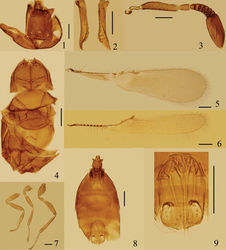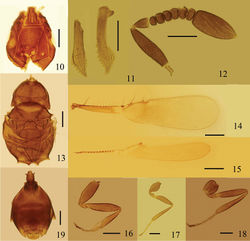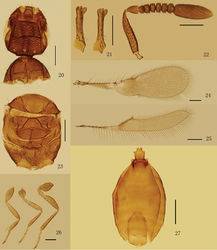Eubroncus
| Notice: | This page is derived from the original publication listed below, whose author(s) should always be credited. Further contributors may edit and improve the content of this page and, consequently, need to be credited as well (see page history). Any assessment of factual correctness requires a careful review of the original article as well as of subsequent contributions.
If you are uncertain whether your planned contribution is correct or not, we suggest that you use the associated discussion page instead of editing the page directly. This page should be cited as follows (rationale):
Citation formats to copy and paste
BibTeX: @article{Jin2014ZooKeys399, RIS/ Endnote: TY - JOUR Wikipedia/ Citizendium: <ref name="Jin2014ZooKeys399">{{Citation See also the citation download page at the journal. |
Ordo: Hymenoptera
Familia: Mymaridae
Name
Eubroncus Yoshimoto, Kozlov & Trjapitzin, 1972 – Wikispecies link – Pensoft Profile
- Eubroncus Yoshimoto, Kozlov & Trjapitzin, 1972: 879. Type species: Eubroncus orientalis Yoshimoto, Kozlov & Trjapitzin, 1972, by original designation.
- Stomarotrum Yoshimoto, Kozlov & Trjapitzin, 1972: 879. Type species: Stomarotrum prodigiosum Yoshimoto, Kozlov & Trjapitzin, 1972, by original designation; synonymy by Triapitsyn and Huber 2000[1]: 603.
Diagnosis
Head strongly angular (or subtriangular) in lateral view. Vertex (Figs 1, 10, 20, 28) with a pair of placoid sensilla in front of post ocelli. Mandibles (Figs 2, 11, 21) not crossing medially, extremely long and narrow, with strong apical teeth and rows of denticles on ventral margin. Female antenna with funicle 6-segmented and clava 1-segmented. Pedicel distinctly longer than fl1, fl1 without mps, fl2–fl6 and clava each with numerous mps. Hind wing (Figs 6, 15, 25, 30) relatively wide with broadly rounded apex, disc begins at wing’s base, submarginal vein striped by alternating hyaline and infuscate areas. Tarsi 4-segmented. Protibial spur (Figs 7, 16, 26) comb-like. Male antennal flagellum (Fig. 29) 11-segmented. (Note: this diagnosis applies to examined species from China because authors have not examined any other material of this genus. Hosts of all Eubroncus are unknown)
Key to species of Eubroncus of the world
(Note: females are not known for orientalis; males are not known for indicus, hani, and tibetanus)
Taxon Treatment
- Jin, X; Li, C; 2014: First record of Eubroncus (Hymenoptera, Mymaridae) from China, with description of three new species ZooKeys, 399: 29-41. doi
Other References
- ↑ Triapitsyn S, Huber J (2000) Fam. Mymaridae-mymarids. In: Ler P (Ed) Key to the insects of Russian Far East 4(4), Dal’nauka, Vladivostok, 603–614. [In Russian]
- ↑ 2.0 2.1 Yoshimoto C, Kozlov M, Trjapitzin V (1972) A new subfamily of Mymaridae (Hymenoptera, Chalcidoidea, Mymaridae). Entomologicheskoe Obozrenie 51(4): 878-885. [In Russian] [English translation: Entomological Review 51: 521–525]
Images
|



